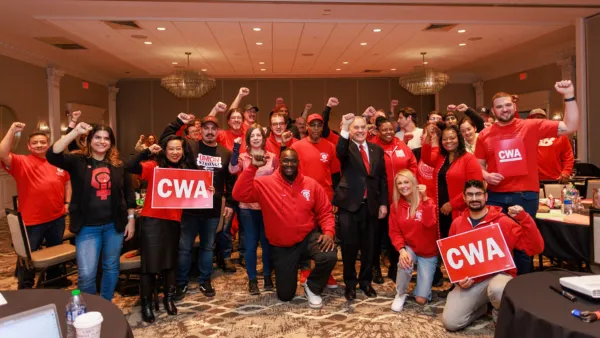What's an LPAT?

Legislative Political Action Team (LPAT)
Download a PDF copy of this page here
Building Political Union Power
The most important work we do as a union is at the bargaining table, gaining better wages, working conditions, and terms of employment for our members. But again and again, we see how advances made at the bargaining table can be lost through a single action of Congress or a state legislature. Other times, we can’t win what we need at the bargaining table alone—we need to work with pro-labor champions in elected office and win pro-worker legislation.
Virtually every day, legislators across the country make decisions that vitally affect us, regarding basic collective bargaining rights, telecommunications policy, health care, taxes, trade, FMLA, social security, safety and health, pensions, public services, etc. The list is endless.
That is why CWA members need to get involved—at every level of our union—in the democratic process. We must help elect candidates that represent the concerns of CWA members and workers, not just corporations and the super-wealthy. We must communicate our views to elected officials and hold them accountable after the election.
Corporations and the wealthiest Americans have increased their influence over state and federal legislation. This has tilted many laws and regulations against the interests of workers and the working class. Through our LPAT activism in CWA, we can push back and give voice to workers’ concerns.
Legislative and Political Action Teams
Legislative Political Action Teams (LPATs) are made up of local legislative and political activists in each local. Every local is required to have an LPAT. The purpose of an LPATs is to strengthen and move CWA’s legislative and political program. LPATs are led by an LP coordinator and meet regularly.
Five Elements of LPAT Work
1. CWA LEGISLATIVE EFFORTS
- Improve our members’ work and lives by passing pro-worker legislation or
through the regulatory process. - Protect our members from harmful legislation.
- Social justice agenda: join coalitions for the greater good such as racial justice, climate justice, taking on Wall Street, etc.
- Ensure implementation of CWA priority legislation such as clinical staffing committees and broadband buildout implementation.
- CWA’s legislative efforts include grassroots lobbying, campaigning through phone banking, rallying, workplace canvassing, letter & postcard writing campaigns, and more.
2. CWA POLITICAL ACTION
- Candidate endorsements.
- Workplace canvassing, surveying co-workers’ views on public issues, and providing them with information on candidates.
- Get-out-the-vote through volunteer phone banking, text banking, labor walks, etc.
- Relationships with elected officials.
- Holding elected officials accountable.
3. CWA POLITICAL EDUCATION
- Political Organizing & Skill Building: how to recruit for volunteer activities and how to run volunteer activities like volunteer phone banking, labor walks, etc, and how to raise money for the Political Action Fund
- Political education: Increase understanding of economic realities and build economic, racial, and social justice consciousness
- Full suite of CWA D1 Political Action Trainings.
- All trainings are run by CWA member-trainers.
4. CWA POLITICAL ACTION FUND
- Raise money for the CWA Political Action Fund.
- PAF is a non-partisan political action committee that fights for workers' political power. Voluntary contributions go toward policies and candidates that defend workers' rights. More: CWA Political Action Fund
5. CWA MOVEMENT BUILDING
- Join with other unions in the labor movement.
- Join local and broader community coalitions and movement partners for the greater good. Fight to make our communities safe, protect our right to vote, and keep jobs in our communities.